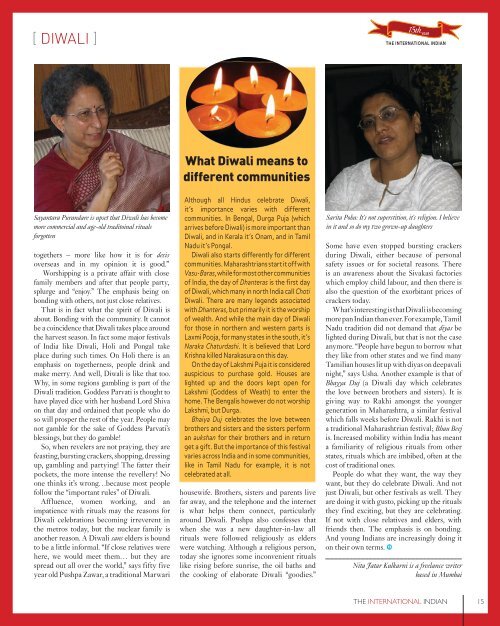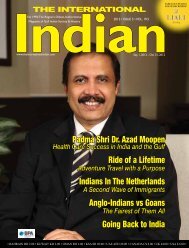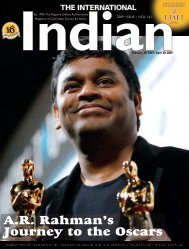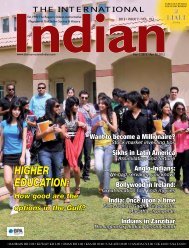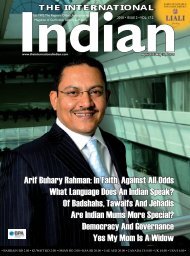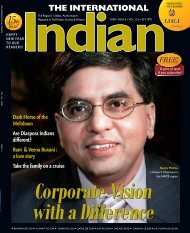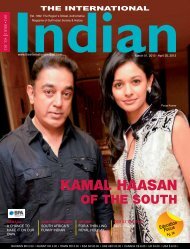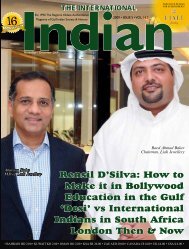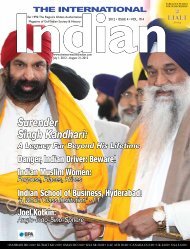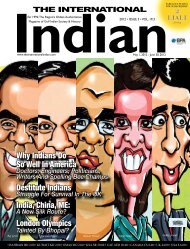THE BUSINESS OF EDUCATION - International Indian
THE BUSINESS OF EDUCATION - International Indian
THE BUSINESS OF EDUCATION - International Indian
You also want an ePaper? Increase the reach of your titles
YUMPU automatically turns print PDFs into web optimized ePapers that Google loves.
[ DIWALI ]<br />
Sayantara Purandare is upset that Diwali has become<br />
more commercial and age-old traditoinal rituals<br />
forgotten<br />
togethers – more like how it is for desis<br />
overseas and in my opinion it is good.”<br />
Worshipping is a private affair with close<br />
family members and after that people party,<br />
splurge and “enjoy.” The emphasis being on<br />
bonding with others, not just close relatives.<br />
That is in fact what the spirit of Diwali is<br />
about. Bonding with the community. It cannot<br />
be a coincidence that Diwali takes place around<br />
the harvest season. In fact some major festivals<br />
of India like Diwali, Holi and Pongal take<br />
place during such times. On Holi there is an<br />
emphasis on togetherness, people drink and<br />
make merry. And well, Diwali is like that too.<br />
Why, in some regions gambling is part of the<br />
Diwali tradition. Goddess Parvati is thought to<br />
have played dice with her husband Lord Shiva<br />
on that day and ordained that people who do<br />
so will prosper the rest of the year. People may<br />
not gamble for the sake of Goddess Parvati’s<br />
blessings, but they do gamble!<br />
So, when revelers are not praying, they are<br />
feasting, bursting crackers, shopping, dressing<br />
up, gambling and partying! The fatter their<br />
pockets, the more intense the revellery! No<br />
one thinks it’s wrong…because most people<br />
follow the “important rules” of Diwali.<br />
Affluence, women working, and an<br />
impatience with rituals may the reasons for<br />
Diwali celebrations becoming irreverent in<br />
the metros today, but the nuclear family is<br />
another reason. A Diwali sans elders is bound<br />
to be a little informal. “If close relatives were<br />
here, we would meet them… but they are<br />
spread out all over the world,” says fifty five<br />
year old Pushpa Zawar, a traditional Marwari<br />
What Diwali means to<br />
different communities<br />
Although all Hindus celebrate Diwali,<br />
it’s importance varies with different<br />
communities. In Bengal, Durga Puja (which<br />
arrives before Diwali) is more important than<br />
Diwali, and in Kerala it’s Onam, and in Tamil<br />
Nadu it’s Pongal.<br />
Diwali also starts differently for different<br />
communities. Maharashtrians start it off with<br />
Vasu-Baras, while for most other communities<br />
of India, the day of Dhanteras is the first day<br />
of Diwali, which many in north India call Choti<br />
Diwali. There are many legends associated<br />
with Dhanteras, but primarily it is the worship<br />
of wealth. And while the main day of Diwali<br />
for those in northern and western parts is<br />
Laxmi Pooja, for many states in the south, it’s<br />
Naraka Chaturdashi. It is believed that Lord<br />
Krishna killed Narakasura on this day.<br />
On the day of Lakshmi Puja it is considered<br />
auspicious to purchase gold. Houses are<br />
lighted up and the doors kept open for<br />
Lakshmi (Goddess of Weath) to enter the<br />
home. The Bengalis however do not worship<br />
Lakshmi, but Durga.<br />
Bhaiya Duj celebrates the love between<br />
brothers and sisters and the sisters perform<br />
an aukshan for their brothers and in return<br />
get a gift. But the importance of this festival<br />
varies across India and in some communities,<br />
like in Tamil Nadu for example, it is not<br />
celebrated at all.<br />
housewife. Brothers, sisters and parents live<br />
far away, and the telephone and the internet<br />
is what helps them connect, particularly<br />
around Diwali. Pushpa also confesses that<br />
when she was a new daughter-in-law all<br />
rituals were followed religiously as elders<br />
were watching. Although a religious person,<br />
today she ignores some inconvenient rituals<br />
like rising before sunrise, the oil baths and<br />
the cooking of elaborate Diwali “goodies.”<br />
Sarita Poha: It’s not superstition, it’s religion. I believe<br />
in it and so do my two grown-up daughters<br />
Some have even stopped bursting crackers<br />
during Diwali, either because of personal<br />
safety issues or for societal reasons. There<br />
is an awareness about the Sivakasi factories<br />
which employ child labour, and then there is<br />
also the question of the exorbitant prices of<br />
crackers today.<br />
What’s interesting is that Diwali is becoming<br />
more pan <strong>Indian</strong> than ever. For example, Tamil<br />
Nadu tradition did not demand that diyas be<br />
lighted during Diwali, but that is not the case<br />
anymore. “People have begun to borrow what<br />
they like from other states and we find many<br />
Tamilian houses lit up with diyas on deepavali<br />
night,” says Usha. Another example is that of<br />
Bhayya Duj (a Diwali day which celebrates<br />
the love between brothers and sisters). It is<br />
giving way to Rakhi amongst the younger<br />
generation in Maharashtra, a similar festival<br />
which falls weeks before Diwali. Rakhi is not<br />
a traditional Maharashtrian festival; Bhau Beej<br />
is. Increased mobility within India has meant<br />
a familiarity of religious rituals from other<br />
states, rituals which are imbibed, often at the<br />
cost of traditional ones.<br />
People do what they want, the way they<br />
want, but they do celebrate Diwali. And not<br />
just Diwali, but other festivals as well. They<br />
are doing it with gusto, picking up the rituals<br />
they find exciting, but they are celebrating.<br />
If not with close relatives and elders, with<br />
friends then. The emphasis is on bonding.<br />
And young <strong>Indian</strong>s are increasingly doing it<br />
on their own terms.<br />
Nita Jatar Kulkarni is a freelance writer<br />
based in Mumbai<br />
<strong>THE</strong> INTERNATIONAL INDIAN 15


